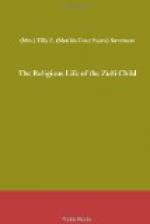The K[=o]-y[=e]-m[=e]-shi and K[=o]-m[=o]-k[)e]t-si passed down through the interior of the mountain into the depths of the lake, the waters of everlasting happiness. In the passageway are four chambers, where the couple tarried on their way and where at the present time the two priests of the K[=o]k-k[=o] rest in their journey to the sacred waters. So credulous are the people that the priests delude them into the belief that they actually pass through the mountain to the lake.
Having heard of the wonderful cave in this mountain, our little party visited the place, prepared to explore it. Mr. Stevenson and Mr. H.L. Turner entered the fissure in the rock and squeezed through the crevice for sixteen or eighteen feet to where the rock was so solid that they both determined no human creature could penetrate farther. They examined the place most carefully by means of an artificial light. Through a small aperture stones could be thrown to a depth from which no sound returned, but excepting this solitary opening all was solid, immovable rock. In this cave many plume sticks were gathered. Near the opening of the cave, or fissure, is a shrine to the K[=o]k-k[=o], which must be very old, and over and around it are hundreds of the plume sticks and turquoise and shell beads.
I would mention here a little incident illustrative of the superstitious dread these Indians entertain of violating the priestly commands. We found it very difficult to persuade an old Zuni guide, who had visited the sacred salt lake, the mountain of the war gods, and other places of interest with us (to these he had gone by special permission of the High Priest), to accompany us to the spirit lake and the mountain of the K[=o]k-k[=o]. Our persuasive powers were almost exhausted ere we could induce him to guide us to them, but having consented he was willing to go even if he should be punished by death. He was a man renowned for bravery, but he was so overcome by his superstitious fears that his voice sank to a whisper and finally became scarcely audible. The morning of the day on which we reached this place, the old man, who had been riding by my side, ahead of the rest of the party, suddenly halted and said in a half-angry voice, “Why do I go ahead? I am not the chief of this party. Those who belong at the head must go to the head.” And he would not move until Mr. Stevenson and I went in advance. By this change he sought to transfer the responsibility to us. Finally he rode up to us and said in a whisper, “We will camp here.” The whole expression of the old man’s face was that of ghastly terror. I was much annoyed, for I thought that, at the eleventh hour, his fear had overcome his desire to gratify us. Just then a Mexican lad on horseback approached; we were all mounted. I asked the lad, “Is there a lake near by?” He replied, “Yes, a half a mile off.” The old Indian said, speaking in a whisper, “And you have seen it?” “Yes.” “And you were not afraid?” “No; why afraid?” “And you looked into the waters and you did not die!” With a look of bewilderment the youth rode off. I signaled to the old man to accompany us to the lake. “No, no; I would only die, and you must not go or you will die.” “No,” said I, “we will not die if our hearts are good, and if you will not go it is because your heart is not good and you are afraid.”




